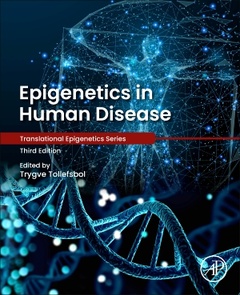Epigenetics in Human Disease (3rd Ed.) Translational Epigenetics Series
Coordonnateur : O Tollefsbol Trygve

Epigenetics in Human Disease, Third Edition examines the diseases and conditions on which we have advanced knowledge of epigenetic mechanisms, such as cancer, autoimmune disorders, aging, metabolic disorders, neurobiological disorders and cardiovascular disease. From molecular mechanisms and epigenetic technology to clinical translation of recent research, the nature and applications of the science is presented for those with interests ranging from the fundamental basis of epigenetics to therapeutic interventions for epigenetic-based disorders, with an emphasis throughout on understanding and application of key concepts in new research and clinical practice.
Fully revised and up-to-date, this Third Edition discusses topics of current interest in epigenetic disease research, including stem cell epigenetic therapy, bioinformatic analysis of NGS data, epigenetic mechanisms of imprinting disorders, microRNA in cancer, epigenetic approaches to control obesity, epigenetics and airway disease, and epigenetics in cardiovascular disease. Further sections explore online epigenetic tools and datasets; early-life programming of epigenetics in age-related diseases; the epigenetics of addiction and suicide, and epigenetic approaches to regulating and preventing diabetes, cardiac disease, allergic disorders, Alzheimer?s disease, respiratory diseases, and many other human maladies. In addition, each chapter now includes chapter summaries, definitions, and vibrant imagery and figures to reinforce understanding, as well as step-by-step methods and disease research case studies.
Section I: Introduction 1. Epigenetics of Human Disease: An Overview
Section II: Methodology 2. Methods and Strategies to Determine Epigenetic Variation in Human Disease 3. DNA Methylation–Based Measures of Biological Aging 4. Bioinformatics of Epigenomic Data Generated From Next-Generation Sequencing
Section III: Human Cancer 5. DNA Methylation Alterations in Human Cancer 6. Alterations of Histone Modifications in Cancer 7. MicroRNA in Cancer 8. Epigenetic Approaches to Cancer Therapy
Section IV: Neurological Disease 9. Epigenetics in Neurobehavioral Disease 10. Emerging Role of Epigenetics in Human Neurodevelopmental Disorders 11. The Epigenetics of Alzheimer's and Other Neurodegenerative Disorders 12. Epigenetic Modulation of Human Neurobiological Disorders
Section V: Autoimmune Disease 13. Epigenetic Basis of Autoimmune Disorders in Humans 14. Approaches to Autoimmune Diseases Using Epigenetic Therapy
Section VI: Metabolic Disorders 15. Epigenomics and Human Obesity 16. Epigenetic Approaches to Control Obesity 17. Early-Life Nutrition, Epigenetics and Prevention of Obesity 18. Epigenetics of Diabetes in Humans 19. The Potential of Epigenetic Compounds in Treating Diabetes
Section VII: Other Disorders/Diseases 20. Epigenetic-Processes Driven Disorders and Therapeutics 21. Epigenetics of Allergic Diseases Allergies, Eczema, Asthma, and Rhinitis 22. Therapy of Airway Disease: Epigenetic Potential 23. The Role of Epigenetics in Cardiovascular Disease 24. Epigenetic Treatment Approaches to Cardiovascular Disease 25. Epigenetics and Human Infectious Diseases 26. Therapy of Infectious Diseases Using Epigenetic Approaches 27. Translational Aspects of the Endometriosis Epigenome 28. Aberrant DNA Methylation Patterns in Gynecologic Cancers: Implications for Prevention and Therapy 29. Epigenetics in Human Reproduction and Gynecologic Diseases
Section VIII: Development, Aging and Transgenerational Effects 30. Epigenetics of Transgenerational Inheritance of Disease 31. Epigenomic Mechanisms of Human Developmental Disorders 32. Therapeutic Approaches to Imprinting Diseases 33. Stem Cell Epigenetics and Human Disease 34. Noncoding RNA Regulatory Networks, Epigenetics, and Programming Stem Cell Renewal and Differentiation: Implications for Stem Cell Therapy 35. Aging and Disease: The Epigenetic Bridge 36. Epigenetic Programming of Human Disease and Aging
Section IX: Future Research 37. Epigenetic Prospects in Epidemiology and Public Health
- Includes contributions from leading international investigators involved in translational epigenetic research and therapeutic applications
- Integrates methods and applications with fundamental chapters on epigenetics in human disease, along with an evaluation of recent clinical breakthroughs
- Presents side-by-side coverage of the basis of epigenetic diseases and treatment pathways
- Each chapter updated to include summaries, definitions, and vibrant imagery and figures to reinforce understanding
- Features step-by-step methods and disease research case studies to put book concepts into practice
Date de parution : 09-2023
Ouvrage de 1300 p.
19x23.4 cm
Disponible chez l'éditeur (délai d'approvisionnement : 14 jours).
Prix indicatif 264,10 €
Ajouter au panier


